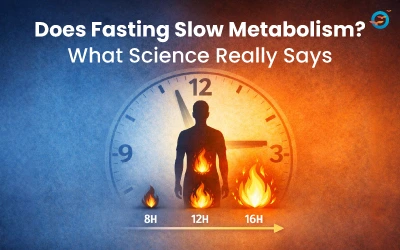Why Menopausal Weight Loss Feels So Hard and How to Fix It Naturally?

You’re eating right. You’re exercising. Yet the scale refuses to move. If this sounds familiar, you’re not alone. Many women going through menopause face the same struggle despite their best efforts.
The reason is simple: menopause changes how the body handles energy. What worked in your 30s might not work now. But that doesn’t mean weight loss is impossible. You just need a smarter, calmer, and more body-aware approach.
Why Weight Loss Feels So Hard During Menopause?
During menopause, falling estrogen levels cause your metabolism to slow down. Muscle mass decreases, fat distribution shifts, and the body becomes slightly insulin resistant meaning sugar and carbs are more easily stored as fat.
At the same time, stress and sleep issues raise cortisol levels, which trigger cravings and increase belly fat storage. These natural shifts make weight gain in menopause more likely even if your habits haven’t changed.
Understanding this biology helps take the guilt out of the process. The goal is not to fight your body but to work with it.
Why Your Health Matters More Than the Number on the Scale?
Here’s the truth; most people miss menopause is not the time to chase extreme weight loss. The body has a genetic upper limit (the highest weight you’ll likely reach) and a natural lower limit it won’t go below easily. Your job is to keep fat away from vital organs like the liver and pancreas to prevent metabolic disease.
Even if the number on the scale doesn’t drop, maintaining or slightly reshaping your body is a success. During menopause, any weight you don’t gain is a real win.
Two Diet Rules for Menopausal Weight Loss
1. Manage Carbohydrate Exposure
Most women unknowingly eat carbohydrates in all three meals; rice, roti, bread, or sweets.
During menopause, this constant carb intake keeps insulin high and makes fat burning harder.
A simple shift can help:
- Limit carbs to one or one-and-a-half meals a day.
- Include protein and fiber in every meal; dal with salad, paneer with vegetables, or eggs with greens.
- Choose natural, unprocessed foods as your main energy source.
This small change improves energy levels, reduces bloating, and gently supports menopausal weight loss without feeling restrictive.
2. Eat Clean and Embrace Gentle Fasting
Fasting doesn’t mean starvation, it simply means giving your body a break from constant energy intake. On days when you’re not very hungry, skip a meal or delay breakfast. Sip on green tea, black coffee, or water, and allow your body to rest and repair.
Also, clean up your meals:
- Avoid deep-fried and sugary foods.
- Opt for light, wholesome meals with fruits, curd, lentils, and vegetables.
- Listen to your hunger, not the clock.
This approach is one of the most effective natural remedies for menopause, helping balance hormones and stabilize mood.
Two Exercise Rules for Menopause
1. Focus on Strength and Stability
The goal of exercise during menopause isn’t punishment, it’s preservation. Prioritize strength-building and balance-enhancing workouts like Pilates, yoga, or light resistance training. These protect bone density, support joint stability, and help retain lean muscle mass all crucial for a healthy metabolism.
2. Avoid Overexertion and Metabolic Stress
Intense, high-impact workouts may backfire during menopause. Overtraining increases cortisol levels, leading to fatigue, hunger spikes, and slower recovery.
Instead, choose low-impact, consistent activity brisk walking, yoga, or Pilates. These workouts calm the nervous system, reduce inflammation, and help the body burn fat more efficiently.
Why Mindset Plays a Huge Role in Menopausal Weight Loss?
Menopause is a decade of transition not a few months of struggle. When you stop fighting your body and start supporting it, everything changes. Focus on eating clean, resting well, moving gently, and staying consistent.
You might not lose 10 kilos overnight but you’ll gain something far more important: energy, clarity, and confidence in your body again.
Conclusion
Menopausal weight loss isn’t about diets or deadlines. It’s about understanding your body’s new rhythm and adjusting with wisdom, not willpower. With balanced food, mindful fasting, and stress-free movement, you can feel light, strong, and healthy through this stage naturally.
Because true success isn’t about the number on the scale it’s about how well you live in your body every single day.
Want to know the smartest way to start weight loss without eating less? Visit our blog.
FAQs
- Should I focus on weight loss during menopause, or something else?
Focus on maintaining strength, stable energy, and keeping fat away from internal organs. Weight maintenance itself is success. - How should I manage my carbohydrate intake for menopausal weight loss?
Limit carbs to one or one-and-a-half meals per day and combine them with protein and fiber for better blood sugar balance. - Why is my weight not dropping even though I’m exercising?
Fat often converts to muscle in early stages of fitness, so weight may remain constant while body composition improves. - What type of exercise is recommended for menopausal women?
Gentle strength and stability routines like yoga, walking, or Pilates for menopause maintain muscle and protect joints. - What are the main dietary changes I should make during menopause?
Eat clean, avoid fried or refined foods, and focus on whole plant-based meals and moderate protein.
6. Should I try fasting for menopausal weight management?
Yes, intermittent or mindful fasting can reduce insulin spikes and help regulate appetite naturally.

